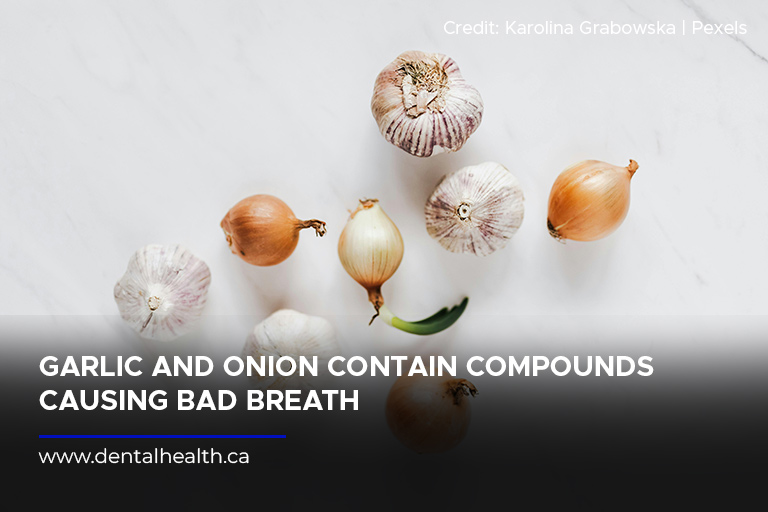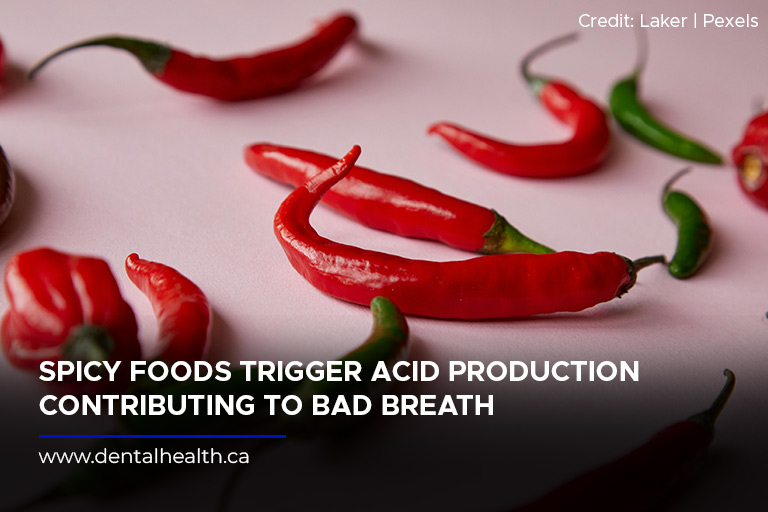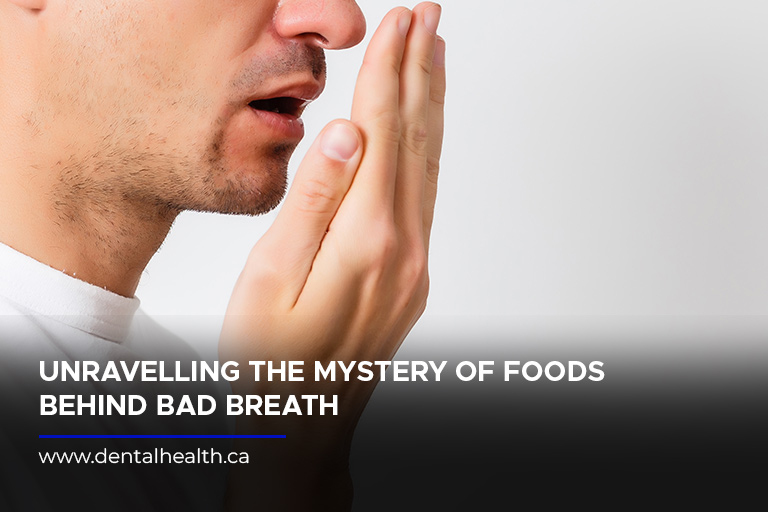Bad breath, medically known as halitosis, affects everyone at some point. While often linked to poor dental hygiene, the foods we consume play a significant role in our breath’s freshness. Understanding the relationship between diet and oral health can empower us to make informed choices, ensuring our breath remains pleasant throughout the day.
Recognizing the impact of certain foods on our breath is the first step towards managing halitosis. By identifying these foods and understanding their effects, individuals can make dietary adjustments to minimize their impact. Incorporating diet and bad breath prevention strategies is crucial in this context. Additionally, addressing bad breath promptly can prevent discomfort and potential embarrassment in social and professional settings. With practical advice and preventive measures focused on diet and bad breath prevention, this guide serves as a valuable resource for anyone looking to improve their oral health and confidence.
Foods to Avoid for Fresh Breath

- Garlic and Onions: Garlic and onions are known for their health benefits but also cause bad breath due to the release of volatile sulphur compounds during digestion. These compounds, like allicin in garlic, can be absorbed into the bloodstream and exhaled, causing a distinctive odour that can linger for hours or days. Eliminating this bad breath through regular oral hygiene is challenging.
- Dairy Products: Dairy products, such as milk and cheese, are high in proteins that can be broken down by mouth bacteria into sulphur compounds, leading to bad breath. Individuals with lactose intolerance may experience worsening effects due to fermented lactose in the mouth and gut, and residue from dairy products can also attract bacteria.
- Coffee: The acidity of coffee can lead to dry mouth, a condition that increases the risk of bad breath due to decreased saliva production. The strong aroma of coffee can also mix with other mouth compounds, creating a lingering, difficult-to-neutralize breath, affecting oral freshness.
- Alcohol: Alcoholic beverages can cause dry mouth by reducing saliva flow, which is crucial for maintaining oral hygiene. This decrease in saliva production allows bacteria to thrive, leading to foul-smelling compounds and unpleasant breath. This effect persists after alcohol consumption, making hydration essential.
- High-Sugar Foods: Sugar-rich foods are a feast for mouth bacteria, leading to acid production and bad breath. This acid can promote foul-smelling bacteria growth and contribute to tooth decay. Minimizing sugar intake is crucial as the cycle of bacteria feeding on sugar and producing acid is a key reason for bad breath.
- Acidic Foods: Citrus fruits and tomatoes can worsen acid reflux, a condition where stomach acid returns to the esophagus, causing discomfort, sour taste, and foul smell. This irritation can cause persistent breath issues until the acid levels are neutralized or reflux subsides. Proper management of acidic food intake can help mitigate this issue.
- Fish: Fish, especially those with dense proteins like anchovies and sardines, can cause bad breath due to the release of sulphur compounds in the mouth and digestive system. These compounds emit a fishy or foul odour, and the effect is more pronounced in certain fish types and individuals with specific dietary habits.

- Spicy Foods: Spicy foods, while adding flavour, can also contribute to bad breath due to sulphur compounds in their compounds. These compounds can be exhaled through the lungs, affecting breath freshness. Additionally, they can stimulate the stomach to produce more acid, potentially leading to acid reflux. Modifying spice intake can help manage these effects.
- High-Protein Foods: Protein-rich diets can cause the production of ammonia and other chemicals during digestion, causing a bad breath smell. The body breaks down amino acids in proteins, releasing compounds that contribute to the unpleasant odour when exhaled. Balancing protein intake with other food groups can help mitigate this effect.
How to Combat Food-Related Bad Breath
- Regular Dental Check-ups: Regular dental check-ups are essential for maintaining oral health, as they help detect potential issues like cavities, gum disease, and bad breath early. Addressing these problems prevents them from worsening into more severe issues. Professional cleanings also remove plaque and tartar build-up, leaving the mouth fresher and reducing the risk of halitosis.
- Proper Oral Hygiene: A good oral hygiene routine, including brushing teeth twice daily with fluoride toothpaste, flossing to remove food particles and plaque, and using an antibacterial mouthwash, is crucial for combating bad breath. This not only keeps breath fresh but also prevents tooth decay and gum disease, common causes of bad breath.
- Stay Hydrated: Drinking plenty of water daily is crucial for promoting saliva production, which helps cleanse the mouth, neutralize bacteria’s acids, and remove decaying food particles. A dry mouth creates an ideal environment for bacteria to thrive, so staying hydrated is essential for maintaining breath and preventing oral health issues.
- Mindful Eating: Consuming mindfully and reducing the intake of nutritious foods like garlic, onions, and spices can help manage bad breath. Brushing and rinsing after consumption can also help mitigate their impact. Additionally, incorporating oral health-promoting foods like crisp fruits and vegetables can keep breath fresh. For those dealing with bad breath from the stomach, exploring natural remedies for bad breath from stomach can offer effective solutions, enhancing overall oral hygiene and freshness.
- Chewing Sugar-free Gum: Chewing sugar-free gum stimulates saliva flow, which helps cleanse the mouth by removing food particles and bacteria. Many sugar-free gums contain xylitol, a natural sweetener, which reduces bacteria growth. This habit is convenient for freshening breath on the go, especially when brushing isn’t possible.
- Clean Your Tongue: The tongue can harbour bacteria, food debris, and dead cells that cause bad breath. To remove these deposits, use a tongue scraper or toothbrush bristles. This daily oral hygiene routine ensures a thorough mouth cleanse, reduces halitosis risk, and improves overall oral health by effectively removing these deposits.
- Healthy Snacks: Healthy snacks like apples, carrots, and celery naturally clean teeth and gums by increasing saliva production and removing bacteria and food particles. They contain nutrients supporting oral health, making them an excellent snack choice. Incorporating these foods into your diet not only contributes to a balanced diet but also maintains fresh breath and prevents dental issues.
How do you get rid of bad breath? Understanding the foods that contribute to bad breath and taking proactive steps to prevent it are key to maintaining not just oral health but also overall well-being. Remember, fresh breath boosts confidence, improves social interactions, and reflects your commitment to personal health.
For personalized dental care advice and solutions to bad breath, visit our dentist in Beamsville at Kingsway Family Dentistry or call us at (905) 563-4001. Our team is dedicated to helping you achieve and maintain optimal oral health. Achieve fresh breath and a healthier smile with Kingsway Family Dentistry today.

